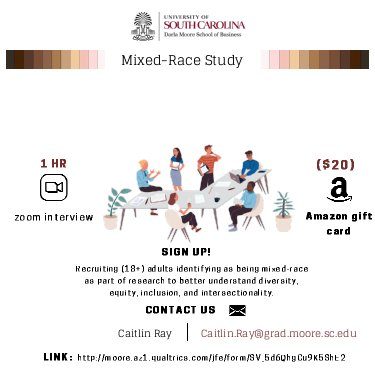How does being of mixed-race influence individuals’ experiences in the workplace? A study on how mixed-race individuals form and view their mixed-race identities is open to participants in the UK, and elsewhere, who are 18+ and currently employed working as part of a group or team (2+ members).
“Data shows that mixed race employees are specifically lacking role models at work” said Jamie Harris, VP, Operations at Black Unicorn in the UK “Being racially ambiguous-looking has made me work harder, reflect more and, eventually, stop settling for less”
The number of individuals in the American workforce who identify as mixed-race is rapidly growing. In fact, individuals made up of two or more races are the fastest growing racial or ethnic group in the U.S. (Census.gov, 2020) with many predicting that 1 in 5 Americans will identify with two or more races or ethnicities by 2050 (Americanprogress.com, 2011). Despite this, most management research acknowledging race focuses on the experiences of individuals who belong to a single racial category (e.g., white, black).
However, mixed-race and biracial individuals are not always considered (nor do they always consider themselves) “fully” in minority groups. Thus, theory based on feelings of membership within racial categories does not consider the complexities of both not fully belonging to and not being fully excluded from racial categories. Therefore, our central research question asks: how does being of mixed-race influence individuals’ experiences in the workplace? Specifically, we plan to explore how mixed-race individuals form and view their mixed-race identities.
By giving voice to mixed-race employees who exist outside, within, and between standard social categories, we broaden our current understanding of how individuals form and manage their racial identities. Participants who are eligible for the study will receive a 20$ Amazon gift card. Click here for the screening survey and signup page for interviews.
In addition to the 20$ Amazon giftcard, we also plan to share the results of our study with all participants. Individuals can also feel free to contact me directly with any questions Caitlin Ray: caitlin.ray@grad.moore.sc.edu
